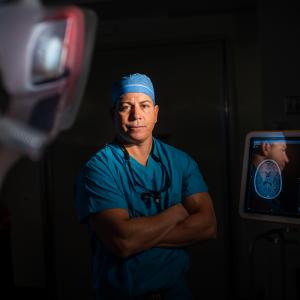When Kristen Mehmedi had her daughter four years ago, she did not like to have her photograph taken. At 5’ 4”, she weighed 320 pounds at her highest weight and was uncomfortable with her appearance. There are not many photos, if any, of her with her newborn child.
Now, at 148 pounds, she takes selfies all the time with her one-year old son, and her Facebook page is filled with confident photos of the 29-year-old Bayshore resident.
“I’m a ‘selfie’ queen,” said Mehmedi recently, laughing.
But it’s more than skin-deep: Mehmedi says that the bariatric, also known as weight loss, surgery she underwent at NYU Winthrop Hospital, performed by Alexander Barkan, MD, has changed her life. “I am now more active and feel much more confident. Best of all, I can shop anywhere,” she said.
As the mother of three young children, Mehmedi wanted to be there for them in the best possible health. She was balancing the needs of her busy full-time job and caring for her young family. Ready to make a change, she turned to NYU Winthrop for help. After careful consideration, she decided that bariatric surgery was the best option for her.
“I tried so many diets, but I wasn’t getting anywhere with them,” said Mehmedi. “I had too much weight to lose, and needed to do it faster than I could on my own.”
NYU Winthrop’s Bariatric Surgery Center offers a full range of weight loss surgery options including laparoscopic gastric banding, laparoscopic roux-en-Y gastric bypass—the kind undergone by Mehmedi—and sleeve gastrectomy. After meeting with Mehmedi, Dr. Barkan recommended gastric bypass surgery.
“Gastric bypass surgery is a minimally invasive procedure that limits the stomach and restructures the intestinal tract to restrict appetite and limit the calories the body can absorb,” said Dr. Barkan. “This was a good option for Ms. Mehmedi because of the more consistent weight loss results associated with the surgery.”
At NYU Winthrop, 99 percent of bariatric procedures are performed using laparoscopic techniques or robotic surgery. In fact, NYU Winthrop was the first hospital in the state to incorporate robotics for bariatric surgery. This contributes to less pain for the patient and safer outcomes.
“Bariatric surgery provides treatment or prevention of the many medical conditions associated with obesity, such as diabetes, high blood pressure, heart disease, and sleep apnea,” said Collin E. Brathwaite, MD, chairman of the Department of Surgery and chief of the Division of Minimally Invasive and Bariatric Surgery at NYU Winthrop. “This is certainly not a cosmetic procedure. Surgery as a tool combined with a lifestyle change involving healthy food choices and exercise usually leads to long-term success.”
Undergoing surgery even wiped out the diabetes symptoms that Mehmedi was experiencing following the birth of her second child. Since her surgery, Mehmedi eats right, leads an active life, and has completed races with friends, which has helped her maintain the results of her surgery.
“She’s done great and has been very successful,” said Dr. Barkan. “As she continued to lose weight she became more and more motivated. She’s taking care of herself and exercising.”
The Bariatric Surgery Center at NYU Winthrop offers patients sensitive and personalized care, supporting them in their every effort to improve overall health and wellbeing. In fact, Mehmedi has spoken at seminars for NYU Winthrop patients who are considering surgery, giving them firsthand knowledge of what to expect. And thanks to her positive experience and encouraging results, both her brother and cousin underwent bariatric surgery (the sleeve gastrectomy and gastric bypass, respectively) with Dr. Barkan, also with great success.
NYU Winthrop Hospital ’s Bariatric Surgery Center offers comprehensive services including consultation, support groups, and pre- and postoperative care in both of its Nassau and Suffolk County offices. The center also offers free educational seminars two times per month—once in Nassau and once in Suffolk. The center accepts most insurance plans. The surgical team includes Dr. Brathwaite, Dr. Barkan, and Keneth Hall, MD.

